- Home
- Joy Dettman
The Tying of Threads Page 7
The Tying of Threads Read online
Page 7
With a length of masonite he scraped what ash he could from the ute’s loading area then got out of the place and drove home, or was driving towards home until he passed the fish and chip shop where his rumbling belly ordered a spring roll and a bag of chips. The door was closed and a sign on it told him it would be closed until midday.
The service station out on Stock Route Road would be open. They sold a bit of take-away tucker – though not at this time of morning. He bought two chocolate-coated ice-creams then, needing privacy in which to eat them, drove again to Gertrude Foote’s land.
*
His second and third loads to the tip that morning consisted of corrugated iron and blackened stumps. He’d found a cache of tools in a corner of the old shed, an axe or two, a selection of rakes, picks and umpteen shovels. He’d found no wheelbarrow, and when he returned with his fourth load, Maisy’s wood barrow rode back out Forest Road with him. He’d filled it with bits of blackened shoes and books, bits of smashed crockery and twisted cutlery before realising he should have thought to pick up a plank while in town. He’d need something to use as a ramp to run that barrow up to the ute’s loading area.
Back in the shade of the shed, he was searching for a plank when he found an old straw hat. Summer may have been over according to the calendar but wasn’t according to today’s weather, and his scab-covered dome didn’t need a dose of sunburn. He shook off the dust and when the hat didn’t fall apart, checked it, internally and externally, for red-backs before trying it on for size. It got a grip on his head and had a strap of elastic to keep it on – perished elastic, but he tied a knot in it then continued his search for something strong enough, long enough, to use as a ramp.
And some bugger crept up on him. ‘What’s lost?’
Bernie turned around faster than he’d turned in a good while and found Harry Hall standing in the doorway, lighting a smoke.
‘I need a ramp,’ Bernie said, feeling his blood pressure rising up to his face.
‘You’ll find something under my house,’ Harry said as he walked by his boss to a half-full wheat bag where he started scooping chook food into a basin.
‘I thought you’d moved into town.’
‘The chooks haven’t,’ Harry said.
He’d been driving logging trucks for Macdonald’s since the thirties, and Bernie, feeling like a comic figure in a woman’s straw hat with elastic under his chin, headed off through bum-high dry grass towards the house recently vacated by that lanky, redheaded, pug-nosed bugger and his part darkie wife.
He found what he needed, found a solid old door which might make a more stable ramp then a plank. Hoisting it onto his shoulder, he returned to his ute and to cackling, squabbling chooks pecking at those lower down the chook hierarchy. They tried out their wings when he dropped the door in their yard, but returned to watch, heads to the side while he scooped out a trench with the heel of his boot, then rammed the end of the door into it. It felt stable enough. He was testing it with his weight when Harry came from behind a clump of saplings, his chook food basin now full of eggs.
‘It might last longer if you fill ’em up and I run ’em up,’ he said.
There was length in that coot, string and bone length, and not much else. ‘Sounds logical to me,’ Bernie said.
They worked together then, one raking, one shovelling, two shadows moving across the ash, the long and the lean, the short and fat in the hat, until the load threatened to spill over the sides of the ute, at which point Bernie tossed shovel and barrow on top, then opened his door.
‘Hang on for a tick,’ Harry said. ‘I’ll bring my ute around.’
Bernie lit a smoke and leaned in the shade of the walnut tree until the second ute, older, with more rattles, backed over the fallen chicken wire fence and across the now raked ash of what had once been Gertrude Foote’s bedroom, to the site of the kitchen Bernie and Shaky Lewis had designed and built. It halted beside an old iron chimney, lying flat on its back.
Bernie remembered its weight from the days of the working bee. ‘It took ten men to put the big bastard up,’ he said.
‘It’s been the bane of my life,’ Harry said. ‘I must have crawled around the roof fifty times trying to plug its leak. It’s going today if I have to take to it with the axe.’
They tested its weight. Harry found a crowbar and, with a bit of leverage, they got it standing on edge. A lot of heaving got half of it loaded. They tossed the metal frame of Gertrude’s treadle sewing machine on top to keep it stable, then Bernie walked to the stove, unmarked by the inferno.
Harry rolled a smoke as he watched him lift one side of it.
‘Leave it,’ he said. ‘It seems somehow sacrilegious for it to end its life at the tip. Let her rest in peace.’
Or rust in peace.
SHOCK THERAPY
Bob Menzies died in May, and to Jenny it was like losing a family member. He’d been around for as long as she’d been voting. Prince Charles flew over to attend the funeral, and seeing him on the television screen made Jenny feel so old. She’d watched him grow from baby to boy, from boy to a man. Hadn’t been allowed to watch her own son grow into a man.
Thought of Jimmy that week. Walked the house at night thinking about him, wondering where he was, what he was doing, whether he had sons who looked like him. She tried to talk about him to Jim, but there were things Jim preferred not to remember.
A bad, bad week that one.
Then winter hit a week before it should have, and on a day when the wind blew sleety rain in from the South Pole, Emma came to work with the news that her husband wanted to take the caravan up to Queensland, that they’d be leaving the first week of June.
‘I can’t do it alone, Jim.’
She didn’t want to do it, alone or otherwise. Jim’s interest in the shop extended no further than the bookwork. She rang the agent the following morning and told him that if the Wallis woman was still interested in renting, to give her whatever she wanted.
‘I want out,’ Jenny said.
They moved in with a cash register which spat out strips of paper, N. and B. Wallis’s Supermarket printed at the top, and within a week, a wet and muddy week, they were complaining about a minor drip in the storeroom Georgie had handled with a strategically placed bucket. N. and B. Wallis weren’t interested in strategically placed buckets. They wanted the roof repaired. They wanted two leaning veranda posts replaced.
Jenny wanted a briquette heater installed in the sitting room. She didn’t get it, and N. and B. Wallis didn’t get their repairs. Amy wanted a goblin and witch rhyme. She didn’t get it either. Jenny’s teeth wouldn’t stop chattering long enough to find a rhyme for witch – other than the obvious, which she now reserved for the Wallis woman.
‘I want a caravan, Jim. I want to go somewhere warm.’
‘All things pass, Jen,’ he said.
‘My life included,’ she said.
*
Maisy had developed a habit of calling in for a cup of tea on Tuesdays, on her way home from her Weight Watchers meeting. They sat in the kitchen. It was warm. On a Tuesday in July, she arrived with a purple brocade suit Jenny had sewn for her several years ago.
‘I’ve got Donna’s wedding next weekend. It hasn’t gone around me for a while, but I’ve lost a bit of weight so I got it out to try it on, and the skirt slid down to my hips. I was wondering if you could run the side seams in a bit for me, love, before next Saturday.’
Jenny knew she’d been dieting, but with so much to lose, her weight loss hadn’t been obvious, or it hadn’t until she tried on that skirt.
‘You’ve lost inches, Maisy.’
‘I must have.’
Gough Whitlam resigned from federal parliament before July ended. He’d been given some figurehead job at a university. Politicians, once they’d served their stint, had it made for life. The taxpayers supported them, supplied them with secretaries and chauffeurs, picked up the bills for their world tours – and if it was acceptable for them to gou
rmandise on the taxpayer teat, then who could blame the bludgers for sucking up the leftovers?
Back in the old days, the peasants had slaved in the fields to keep the rich in their palaces, and as far as Jenny could see, not a lot had changed – apart from the workhouses for the poor. Maybe a bread and water subsistence diet had encouraged a few back to work – or at least slowed down their breeding. Every time she turned around she saw a new Duffy baby in a pram – and wanted to sterilise its mother.
Not a good year, not from day one. She missed Georgie, missed Trudy, worried about Elsie, who was refusing now to leave that bungalow, which at least was warm. Jenny escaped there too often to get away from the annoyance of Jim’s typewriter now rattling all day on her kitchen table. He did a lot of typing for a Willama chap who wrote textbooks.
The Wallis couple were a permanent annoyance. In August, that shop sucked more money from Ray’s insurance account when their minor drip became major, and Jenny was certain the bantam had been up in the roof with a chisel. They’d get a bargain if that sale ever went through. She didn’t want them to get a bargain, but by August they were pushing to buy and Jenny was damn near ready to forge Georgie’s signature to get rid of that shop and its problems.
Elsie and Harry wanted to report Georgie as a missing person, but she’d cashed another cheque in June, which, unless someone else was cashing her cheques, proved to Jenny that she was okay.
On a sunny day in September she ran into Jack Thompson and his widowed mother in Willama. He was Sergeant Thompson now, but in ’58–59, Jenny had known him as Woody Creek’s constable and Georgie’s first and only serious boyfriend. He’d been down at the old place drinking coffee with them the night Joe Flanagan came bellowing across the orchard paddock. Joe – or his red kelpies – had found Tracy taped into a cardboard carton and dumped beside his front fence.
‘How’s Georgie?’ Jack asked, always his first question.
‘We haven’t heard from her. Harry wants to report her missing.’
‘Was she well when she left?’
‘She was quiet. We know she had her stiches removed, that she’s got her chequebook with her. She cashed one in June.’
Jack’s mother lived in Molliston, fifty-odd kilometres east of Willama. An only son, most of his days off were spent on the road, and twice in the past months he’d continued on to Woody Creek. He’d read Georgie’s note.
‘She’s got a good head on her shoulders and an independent streak a mile wide,’ he said. ‘I wouldn’t be too concerned about her while she’s cashing cheques.’
‘I’ve been wondering if, on the strength of that note, I could sell her shop.’
‘She told you to do what you like with it,’ he said. ‘She signed that note – and she’s not likely to sue you, Jen. Have a chat to your solicitor . . . speaking of which, you could be hearing from one in the next weeks. Collins is going to trial. It’s more than likely that you and Georgie will be called.’
‘I spoke to a chap a few months ago and told him I’d do backward somersaults off a thirty-foot springboard if it would get that swine convicted,’ Jenny said.
She’d seen Dino Collins running towards Joe Flanagan’s land that night. She’d heard Raelene call his name.
‘From what I’ve heard recently, the prosecution will need all the help they can get. He’s got himself a damn good story and a top solicitor.’
‘They found his fingerprints on the masking tape used to seal Tracy into that carton,’ Jenny said.
‘A partial. They got good prints off the shifting spanner King used on Georgie’s eyebrow. He’s not denying that the spanner and tape belonged to him, but claims that King lived with him off and on for years and that she’d picked up the tape and spanner from his cabin.’
‘He was driving her car when he crashed.’
‘He’s got a story to cover that too and two blokes who’ll swear in court that they gave him a lift up to Woody Creek the previous day, that he’d been drinking with them out at the commune the night the infant was taken. Collins claims that King turned up at his door at dawn, begging him to give her another chance. Did Georgie see him at the house?’
‘She heard Raelene call his name. Dino. Raelene always called him Dino.’
‘You know he broke a couple of bones in his neck?’ Jack said.
‘The papers said he had spinal injuries.’
‘He’s in a wheelchair. They say he could be in it for life – which will get him the sympathy vote with the jury.’
‘They won’t let him off, will they?’
‘It depends on who gets picked on the day – and I’d better get going. Mum has got a doctor’s appointment.’
That day, Jenny made her own appointment with Jim’s solicitors, and the following Monday morning she and Jim drove together to Willama where Jenny told a condensed tale of the fire, the shop, then offered Georgie’s note.
The solicitor glanced at it, glanced at the rental agreement, asked his receptionist to make photocopies of both then asked if they’d reported their daughter missing.
‘She’s not missing while she’s still cashing cheques,’ Jenny said.
He said he’d get back to them. Jenny told him she hoped it would be soon, then they walked down to the Commonwealth Bank to ask for Georgie’s current bank statement. The teller couldn’t give them a statement, nor could the manager, but he told them one would be posted.
In October, Butterfly Kingdom was released. They found half a dozen copies of it in one of the bookshops and one each of their earlier books. Butterfly Kingdom was as magical as the rest.
Amy had become the face behind their fairytales, the others more than content to hide behind her. Jim and John walked out to the street, Jenny wandered down to the adult fiction shelves where she chose a book, because the redhead on the cover reminded her of Georgie. Rusty, by C.J. Langhall.
Rusty. The first time Georgie had crawled over to investigate Charlie White’s bootlaces, he’d named her Rusty, and in the years she’d worked for him, he’d never called her anything else – except in his will. He’d named her as his major beneficiary and no one in town had wondered why. She’d mothered him during his final years, along with managing his shop.
C.J. Langhall. Jenny mouthed the name, which for some reason sounded familiar, and it couldn’t have been familiar. Rusty was the author’s debut novel. She glanced at the rear cover, which occasionally gave you an idea of what you’d find in the book.
Archie Fleet, a gambling man, lives a subsistence life in a crumbling farmhouse with Rusty, his sixteen-year-old granddaughter. When Archie’s daughter, who for fifteen years he’s believed dead, is arrested for the murder of her in-laws, Archie learns he has two younger granddaughters, one raised by the wealthy in-laws, and one by her drug addict mother.
Archie Fleet reminded Jenny of Archie Foote, and she wanted to read about him and his granddaughters. She bought the book, Amy stopped talking, and they drove home to a letterbox half full of mail, one letter informing Jennifer Hooper that she’d be required to give evidence at the trial of James Collins, due to commence in the final week of November.
She’d argued about attending court the last time a similar letter had arrived. She’d had a good excuse. Trudy, maybe thirteen at the time, had been home from school with hepatitis. As if courts gave a damn. They’d sent her another letter, a subpoena which had forced her to present herself at a given time, at a given place. She’d left Jim at home with Trudy and driven alone to Melbourne, returning the following day on the bus, with a sore head, thanks to Raelene. The one good thing to come of that trip was the night she’d spent with Cara – and Raelene’s subsequent arrest.
Cara would be at Collins’ trial. Jenny wanted to see her. She’d give the court no argument this time.
*
They left Woody Creek on a warm November morning, Jim behind the wheel. He’d taken to the new car like a duck to water and was a more confident driver than she. When they’d owned the old manual Fo
rd, she’d been the main driver, and she wasn’t yet accustomed to the passenger seat. It gave her too much time to look around, gave her time to look at Jim’s face in profile, at his big hands on the wheel.
As a kid she’d ridden a few times in Vern Hooper’s passenger seat, back when Vern had been as slim as Jim. Though she attempted to deny it, Jim did resemble his father. He had the same steel-grey hair, the same long jaw, the same hands. Different eyes and mouth.
After Vern’s stroke, he’d walked with a leg-throwing limp, but by then he’d been older and overweight. Jim’s limp was more habit than handicap. Like everything else, artificial limbs had been improved by technology.
He didn’t dress like his father. Might have, had Jenny not chosen his clothing, had she not chosen the wool for his sweaters and knitted every one he owned. He’d inherited every inch of his father’s height, and, like Vern, he couldn’t buy a sweater long enough in the body and sleeve.
They lost their fine day before they reached Kilmore, and were both looking for sweaters when they arrived in Ringwood.
Nobby was at work. He owned a timberyard. When Jenny had met up again with Jim in ’58, he’d been working for Nobby in the timberyard office and living in a caravan behind his house. Nobby and Rosemary were good friends who they saw too little of – though not too little of their beds, single, one on either side of the spare room. They sagged, complained when their occupant rolled over.
For three nights they slept in them, each day Jenny expecting the call that didn’t come. They were still waiting when five hundred free-loving Americans – husbands, wives, sons, daughters and babies – drank a vat of cyanide so they might follow their leader to his version of paradise. And how could a mother squirt poison into her baby’s mouth, and how could one maniac demand obedience from a community almost as large as Woody Creek’s?

 The Hope Flower
The Hope Flower Trails in the Dust
Trails in the Dust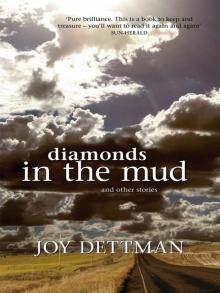 Diamonds in the Mud and Other Stories
Diamonds in the Mud and Other Stories Moth to the Flame
Moth to the Flame The Tying of Threads
The Tying of Threads Wind in the Wires
Wind in the Wires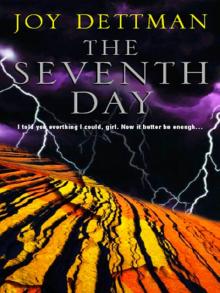 The Seventh Day
The Seventh Day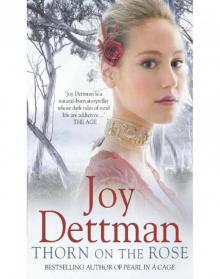 Thorn on the Rose
Thorn on the Rose Jacaranda Blue
Jacaranda Blue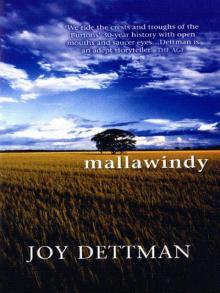 Mallawindy
Mallawindy Ripples on a Pond
Ripples on a Pond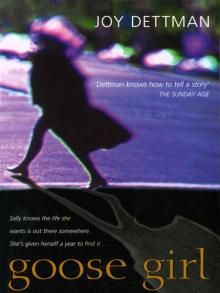 Goose Girl
Goose Girl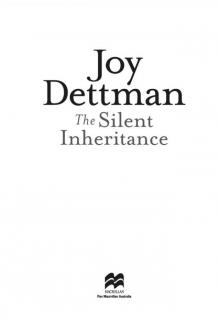 The Silent Inheritance
The Silent Inheritance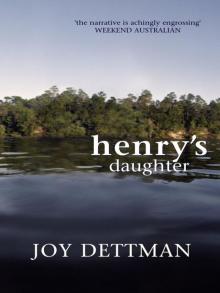 Henry’s Daughter
Henry’s Daughter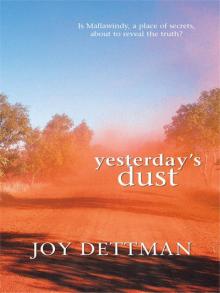 Yesterday's Dust
Yesterday's Dust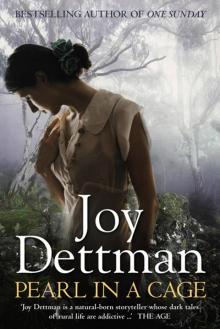 Pearl in a Cage
Pearl in a Cage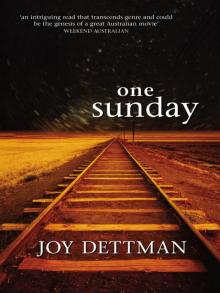 One Sunday
One Sunday